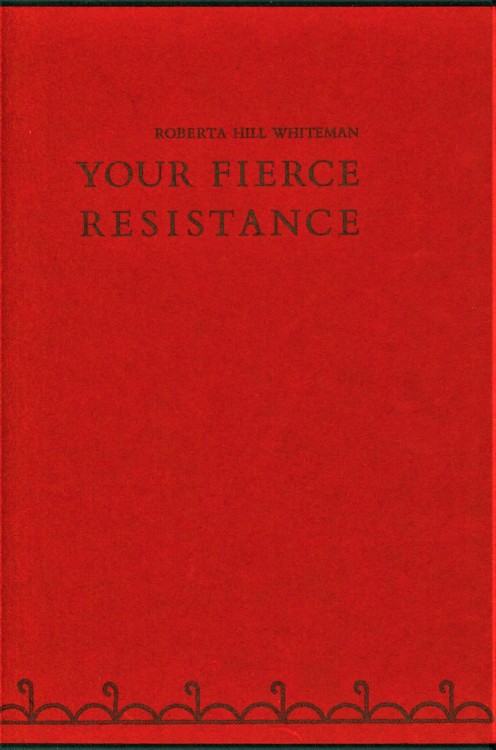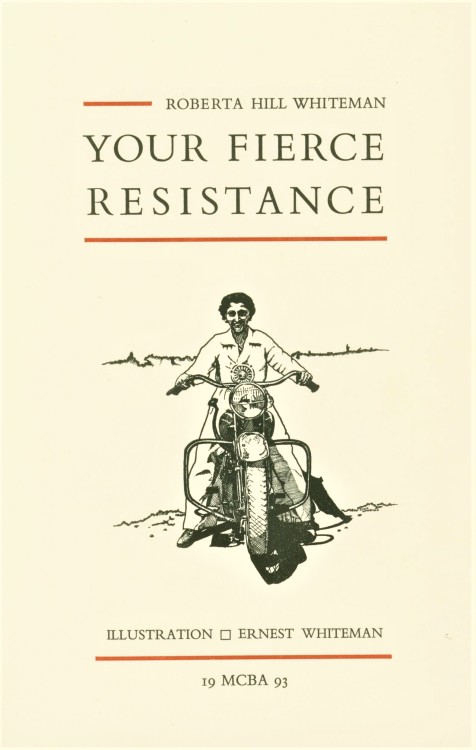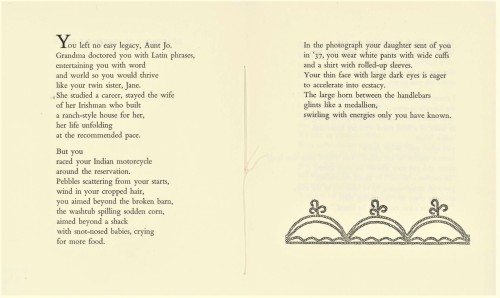First Nations Fine Press FridayRoberta HillIn association with our post this week on Roberta Hill, w
First Nations Fine Press FridayRoberta HillIn association with our post this week on Roberta Hill, we present the fine press printing of an excerpt from Hill’s 1993 poem, Your Fierce Resistance. Printed in an edition of 150 copies at the Minnesota Center For Book Arts (MCBA) in conjunction with literary center The Loft for the Inroads: Writers of Color series,Your Fierce Resistance is an excerpt of a longer poem of the same title. The full-length poem can be found in Roberta J. Hill’s (then, Roberta Hill Whiteman) second poetry book collection, Philadelphia Flowers: Poems, published by the Holy Cow! Press in 1996. The edition was was printed by Robert Johnson of the Melia Press and wood engraver, printer, designer, poet, and illustrator Gaylord Schanilec using Bembo type on Mohawk Superfine paper, with Fabriano Italia endsheets and Moriki Over Arches covers, supported in part by a grant from the National Endowment for the Arts. Hill completed her PhD with a biographical study of her paternal grandmother, Dr. Lillie Rosa Minoka-Hill—the second American Indian woman to earn an M.D. in the United States. Minoka was of Mohawk descent, but had moved with her husband to the Wisconsin Oneida Reservation where she opened a “kitchen clinic” to serve the Oneida peoples. She’s said to have been adopted by the Oneida Nation of Wisconsin—the only person in the 20th century to be officially adopted by them—and was given the name Yo-da-gent, meaning “she who saves” or “she who carries help”. The book, however is dedicated to another family member, Josephine Coté, Hull’s matrilineal aunt. Nonconformity must run in the women of this family, as Hill’s writing honors her aunt’s outward resistance to all pressures of assimilatory expectations, both inside and outside the Oneida reservation. Hill recalls a conversation with Coté, in Your Fierce Resistance,Then you asked me, “What passes from a mother to her child?” You shifted your thin body closer and put your elbows on your knees. “Its mother’s blood. The blood remembers,” you said, straightening up to look me in the eyes, snapping them in your teasing way. “Whatever’s lost can often be found.”Roberta Hill’s three poetry collections revolve around the communal feeling of disconnection within the Oneida Nation’s people, where she utilizes nature-centric Native American/First Nations ideals to take a firm stance against the capitalistic consumption polluting our environment. Hill has read her poems throughout the United States and at International Poetry Festivals in Medellin, Columbia and Poesia Do Mundo in Coimbra, Portugal, as well as in China, Australia, and New Zealand. Hill has retired from her position as a Professor of English and American Indian Studies, affiliated with the Nelson Institute for Environmental Studies, in May of 2020, and now lives in the Driftless area of Wisconsin.View more Fine Press Friday posts.–Isabelle, Special Collections Undergraduate Writing InternWe acknowledge that in Milwaukee we live and work on traditional Potawatomi, Ho-Chunk, and Menominee homelands along the southwest shores of Michigami, part of North America’s largest system of freshwater lakes, where the Milwaukee, Menominee, and Kinnickinnic rivers meet and the people of Wisconsin’s sovereign Anishinaabe, Ho-Chunk, Menominee, Oneida, and Mohican nations remain present. -- source link
Tumblr Blog : uwmspeccoll.tumblr.com
#fine press#roberta hill#josephine cote#robert johnson#gaylord schanilec#the loft#inroads#mohawk#philadelphia flowers#indigenous writers#fabriano#limited edition#isabelle



